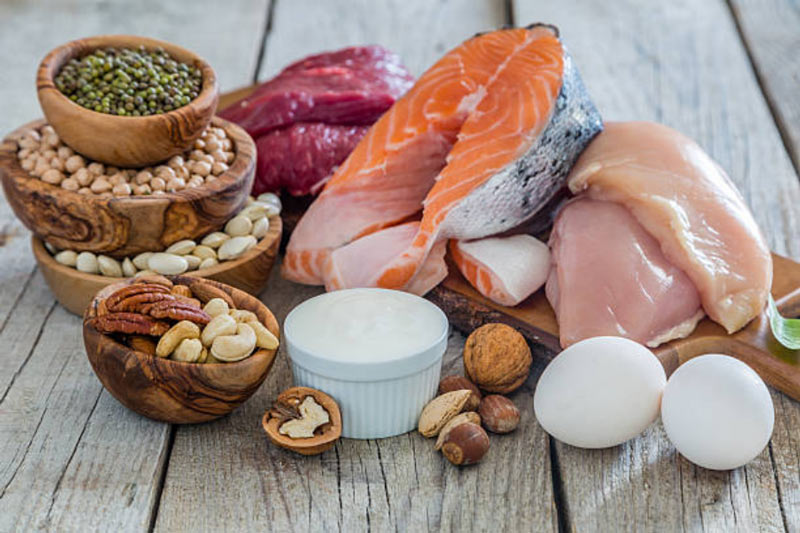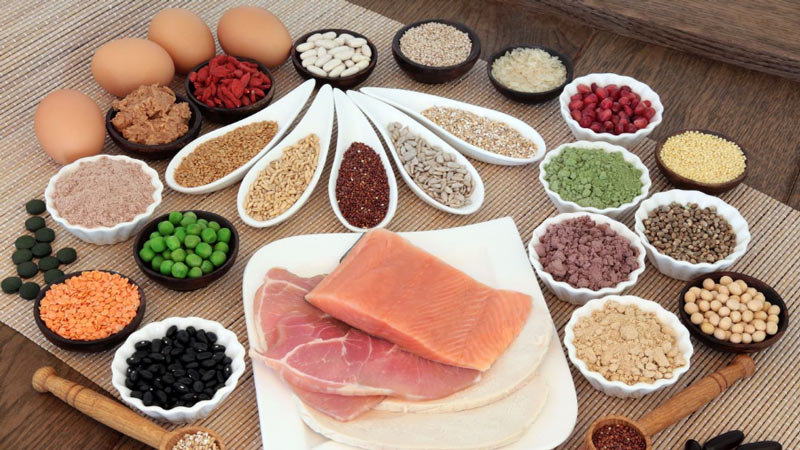If you want to make healthy changes to your diet, start by exploring lean proteins. Eating lean proteins can provide essential nutrients and energy while keeping calories down.
Also, incorporating high-quality protein sources into meals can help reduce the risk of chronic diseases like obesity and heart disease. We'll discuss how you can benefit from including more lean proteins in your everyday eating plan.
Lean Protein Foods

Lean proteins are foods that contain a significant amount of protein without too much-saturated fat. Examples include skinless chicken or turkey breast, lean cuts of beef and pork, fish, eggs, soy products like tofu and tempeh, beans, nuts, seeds, and low-fat dairy products.
These foods provide all the essential amino acids our bodies need to build muscle and other tissue. Additionally, they're incredibly versatile. You can enjoy them in so many delicious ways!
Benefits Of Eating Lean Protein Foods

Eating lean proteins can help you reach your health goals in several ways:
• Weight Management – Incorporating enough lean protein into meals helps curb hunger by keeping you fuller for longer and preventing unhealthy snacking between meals. It also helps reduce overall calorie intake, aiding with weight management.
• Building Muscle – Protein is the building block of muscle. Eating enough lean protein can help build and maintain muscle mass as you exercise or participate in physical activities.
• Improved Metabolism – Protein-rich foods take longer to digest, which can help speed up your metabolism and burn more calories throughout the day.
• Bone Health – Lean proteins contain essential minerals like zinc, phosphorus, magnesium, and iron that keep bones healthy and strong.
• Lower Risk Of Diseases – Studies have shown that diets rich in lean proteins may help reduce the risk of chronic diseases like heart disease, diabetes, and obesity.
• Improved Hair And Skin – Lean proteins are packed with essential vitamins and minerals for healthy hair and skin.
• Brain Health – Lean proteins can help improve cognitive function, memory, and concentration.
• Heart Health – Studies have shown that high-quality lean protein sources can reduce bad cholesterol levels in the blood and lower the risk of heart disease.
You can reap these incredible health benefits by including lean proteins! So start exploring different ways to enjoy them today.
Foods Provide Lean Protein
There are a variety of foods that provide lean protein. Here are some examples:
• Skinless chicken or turkey breast
• Lean cuts of beef, pork, and lamb
• Fish like salmon, cod, trout, haddock, and halibut
• Canned tuna
• Eggs (especially egg whites)
• Low-fat dairy products like yogurt and cottage cheese
• Soy products such as tofu and tempeh
• Beans, including black beans, lentils, and chickpeas
• Nuts and seeds like almonds, chia seeds, and pumpkin seeds
These foods provide all the essential nutrients your body needs while keeping saturated fat content to a minimum. Try incorporating them into your meals for a healthier and more balanced diet.
You can also use plant-based protein powders to supplement your diet. Protein powders offer a convenient way to increase your daily intake of lean proteins without adding too many extra calories. Just check the label for added sugars and other unhealthy ingredients.
In conclusion, eating lean proteins is an important part of maintaining a healthy lifestyle. By including more high-quality protein sources in your everyday diet, you can benefit from improved overall health, weight management, muscle building, bone health, and reduced risk of chronic diseases. So start exploring different ways to enjoy lean proteins today.
Recipes to Incorporate Lean Proteins into Your Diet
If you want to incorporate more lean proteins into your diet, why not explore some delicious recipes? There are so many amazing dishes out there that use lean protein sources. Here are a few ideas to get you started:
• Grilled Salmon and Veggies – This classic dish is a great way to enjoy salmon without adding too much extra fat or calories. Serve it with steamed broccoli and brown rice for a complete meal.
• Egg White Omelette – Start your day with this tasty egg white omelet! Fill it with sautéed veggies like peppers, onions, mushrooms, and spinach for added flavor and nutrients.
• Tofu Stir Fry – This vegan-friendly dish can be made with various veggies and tofu for a protein boost. Serve it over brown rice or quinoa for an extra dose of healthy carbs.
• Slow Cooker Chicken – Use lean chicken breasts in the slow cooker to make this flavorful dish. Add your favorite herbs and spices for an extra boost of flavor.
• Turkey Burgers – Enjoy these delicious turkey burgers on whole-wheat buns with all your favorite toppings on whole-wheat buns. Check the label before buying ground turkey, as some brands may contain added fats and fillers.
• Greek Yogurt Parfait – Start your morning with this easy yet nutritious breakfast option. Layer plain Greek yogurt, nuts, seeds, and berries in a jar for a tasty treat.
These are just a few recipes to incorporate lean proteins into your diet. So start exploring different ways to enjoy these nutritious sources of fuel today.
Healthy Ways to Cook with Lean Protein
Cooking with lean proteins can be a great way to add flavor and variety to your meals while ensuring you get the right nutrition. Here are some tips for cooking with lean proteins:
• Use marinades to add flavor and tenderness – Marinating meat or fish in olive oil, garlic, herbs, and spices can help bring out its natural flavors while adding extra moisture.
• Grill instead of fry – Grilling is a healthier alternative to frying that helps keep the fat content low. Try using vegetable or fruit kabobs as an alternative to greasy burgers and hot dogs.
• Bake instead of boiling – Baking chicken or fish in the oven adds flavor without adding too much fat. You can also use parchment paper to help the food cook.
• Try different cooking methods – Experiment with different cooking methods like stir-frying, steaming, and poaching for added flavor and nutrition.
• Add herbs and spices – Try adding herbs and spices to your dishes for extra flavor without adding too many calories.
By following these tips and exploring new recipes, you can create tasty meals rich in lean protein yet low in saturated fat.
FAQS
Is boiled egg low fat?
Yes, boiled eggs are a low-fat source of protein. Most of their calories come from egg whites, which contain almost no fat.
Are there any plant-based sources of lean protein?
Yes! Some great sources of plant-based lean proteins include tofu, tempeh, edamame, lentils, quinoa, and beans. All these foods contain little to no fat and provide a great source of protein.
How do I start a lean diet?
A lean diet typically consists of whole grains, lean proteins, healthy fats, fruits, and vegetables. Include a variety of these foods in your meals for optimal health benefits. Try to limit processed foods, added sugars, and saturated fat. Exercise regularly and drink plenty of water throughout the day to stay hydrated.
Conclusion
Lean protein foods play an essential role in keeping our bodies healthy. Low-fat and nutrient-rich proteins are great additions to any diet and can help to maintain a balanced and varied meal plan. Lean proteins offer numerous health benefits, including increased muscle mass, improved heart health, enhanced bone strength, and reduced risk of diabetes. Choose fresh rather than processed versions of these amazing protein sources for the best results.

Health Benefits of Gymnema Sylvestre
Apr 26, 2023

Benefits of Hawthorn Berry
Apr 20, 2023

Substitutes for Baking Powder
Apr 26, 2023

Best Foods That Are High In Zinc
Apr 18, 2023

Benefits of Eucalyptus Leaves
Apr 30, 2023

Benefits of Gooseberries
Apr 25, 2023

How to Find Out Your Blood Type
Apr 26, 2023

What Is the A-Positive Blood Type Diet
Apr 30, 2023



